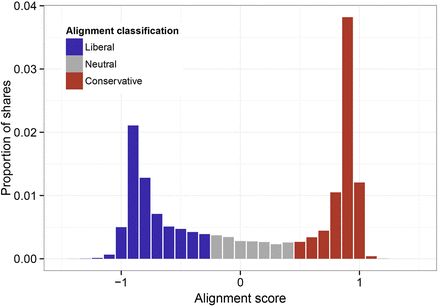Who You Friend on Facebook Says A Lot About Your Political Preferences

A peer-reviewed study published Thursday examines the potentially polarizing effects social media can have on users. Eytan Bakshy, Solomon Messing, and Lada Adamic authored the study titled, Exposure to ideologically diverse news and opinion on Facebook.
In the paper, the authors suggest that ideological 'self-sorting' does happen on Facebook.
The New York Times reports:
After analyzing how more than 10 million of the most partisan users of the social network navigated the site over a six-month period last year, researchers found that people’s networks of friends and the stories they see are in fact skewed toward their ideological preferences.Fig. 1 Distribution of ideological alignment of content shared on Facebook as measured by the average affiliation of sharers, weighted by the total number of shares.
The findings were based on analysis of Facebook users' news viewing, clicking, and sharing habits, which either aligned with or 'cross-cut' ones ideological tendencies.
While social media affords its users the ability to surround themselves exclusively with ideologically-aligned content, the study's authors point out this phenomenon is not nearly as pervasive as some might expect.
From the study:
"This work informs longstanding questions about how media exposure is shaped by our social networks. While partisans tend to maintain relationships with like-minded contacts... on average more than 20 percent of an individual’s Facebook friends who report an ideological affiliation are from the opposing party, leaving substantial room for exposure to opposing viewpoints."
Ultimately, what the average Facebook user is exposed to is more a result of what their friends decide to share as opposed to Facebook's sorting algorithm (which determines what does and does not show up in a news feed).
"Finally, we conclusively establish that on average in the context of Facebook, individual choices more than algorithms limit exposure to attitude-challenging content. Despite the differences in what individuals consume across ideological lines, our work suggests that individuals are exposed to more cross-cutting discourse in social media they would be under the digital reality envisioned by some."
Photo Source: newnoisemagazine




